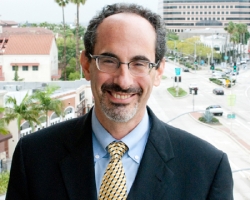The road to City Hall for Scott Malsin began over 20 years ago in west Culver City and with, of all things, trees.
Maslin, then relatively new to Culver City, initiated a tree- planting venture on his block that soon spread to other parts of his neighborhood. That led to an interest in how Culver City’s leaders formulated planning policies, which led to an appointment to the city’s planning commission. Soon after that, he was elected to the council in 2006 and was reelected four year later.
After stepping down from the city council in December, Malsin will be asking voters a third time to making him one of the city’s elected leaders during a time of economic uncertainty and questions about the direction of the “Heart of Screenland.”
In the News third installment of interviews with the six city council candidates, Malsin discussed the reasons why he will be asking the voters to send him back to the council, his controversial decision last year to leave office and his trajectory to City Hall.
“Experience that matters” is one of his campaign’s slogans and the former councilman touts his years of service as a planning commissioner as well as a councilman on the campaign trail. “Mine is the type of experience that will help see us through the next few years and come out on the other end stronger,” Malsin said. “(Experience that matters) is not about just being there; it’s about being engaged, creating, synthesizing, exploring and understanding the issues that will make Culver City a better place.”
Second District County Supervisor Mark Ridley-Thomas is supporting Malsin in his reelection bid. “Scott has been an excellent representative for Culver City on a regional level, and he’s a man of principle with the courage to stand up for what’s right,” said the supervisor, who represents Culver City.
Possessing the requisite knowledge that others may not have, often described as institutional memory, is something that Malsin says he has learned to greatly appreciate over the years. “When I came on the council, I served with three members who had a great deal of understanding about public policy, land use policy, labor issues and so many other things,” the council candidate recalled. “So much of that knowledge is irreplaceable and invaluable, especially since there has been so much turnover within the city’s staff and a lot of that institutional memory no longer exists.
“And I am the one councilman who has worked through so many of the issues that the city has had to confront over the years. We don’t need to make the same mistakes… we don’t need to reinvent the wheel.”
One policy matter where the reservoir of recollections was on display last year came in the form of an ordinance sponsored by Malsin after the tenants of Culver City’s mobile home parks were left out of a community redevelopment plan that ultimately fell through in 2006 but would have left them at the mercy of their landlords if they decided to sell their properties.
Initially, most of the mobile park tenants did not want to leave the area because many were close to work, family, doctors, etc. But before the project was approved, they changed their minds and asked to be involved with the project, where they could have had the option of a larger settlement offer for their homes or the opportunity to rent apartments at the development.
“This happened before I was on the council, but I remember that decision by the council to keep the mobile park residents out of the project,” the former councilman recalled. “It was absolutely stunning to hear this information and the opposite (result) of what the residents wanted… that memory stated with me.”
Under the provisions of the ordinance, prior to any mobile home park owner’s decision to sell, change the use of or close the property, a relocation impact report must be completed and filed with the proper government authorities. The city council would have the right to approve or deny the application.
Park residents would be compensated according to the fair market value of their homes, and the council could also impose other modes of financial help in the form of relocation assistance. Owners could be responsible for the cost of relocating a resident or a family to another comparable park, moving homes that are equipped for relocation and compensation of first and last rent at another park or alternative affordable housing, among other things.
“I wanted to make sure that the residents were taken better care of than they were under existing law,” Malsin explained. “I also wanted to make sure that the property owners were not penalized by the ordinance because I think that is intrinsically wrong as well.”
Malsin stepped down from his council seat in a much-publicized event last December in order to keep his health benefits for his wife and seven –year-old daughter. Beginning this year, members of council are still eligible for lifetime benefits, but their families are not.
The candidate said he welcomes the opportunity to explain his decision to the public as well as discuss the broader topic of healthcare in general. He has been confronted with the question in public forums this year and has been asked whether city elected leaders actually deserve lifetime health benefits.
“The campaign has given me an opportunity to explain my decision and I do welcome it,” he said. “I think people recognize that I was very upfront about this issue.
“For me, it was a matter of integrity to explain the challenge that we were facing,” the council candidate continued. “It’s also afforded me the opportunity to have a real conversation, one on one, with people in the community.”
Some residents take issue with Malsin’s decision to seek office again after he resigned in order to maintain health benefits for his family. In a letter to the editor in the News after the former councilman’s resignation, Jerry Gottschalk stated that he believes that officeholders should not be entitled to such benefits.
“I feel that people serving as city council and school board members should not take benefits as a perk for serving in these capacities,” Gottschalk wrote. “These positions are not their main career. They run on platforms of serving and should not need the incentive of medical and retirement benefits.
“Service on city council and school board are not full-time jobs,” he continued. “The expense of providing these benefits to these here today/gone tomorrow-people adds unnecessary costs to both city and school budgets.”
Whether the former councilman serves out the rest of his unexpired term until 2014 or begins a new four-year stint will depend on where he places in the election, according to Section 604, Paragraph 3 of the city charter.
“If he were to run and receive the highest, second highest or third highest number of votes, then he would serve a four-year term,” Assistant City Manager Martin Cole explained. “If he were to run and receive the least highest number of votes, but receive at least the fourth highest number of votes if there are more than four candidates, then he would serve the unexpired term of the seat he previously vacated.”
One initiative that Malsin would like to see implemented is a citywide infrastructure assessment district to offset the city’s pending budget deficit. “We need to have a conversation about what kind of city we want to live in,” he said. “We find ourselves in a really tough spot since we lost millions of dollars when the redevelopment agencies were eliminated.”
Asked what difficult choices he was willing to make on the council, Malsin responded, “I’m willing to explore every opportunity to reduce our costs further, but we’re talking about a budget deficit that is ballooning since the closure of the redevelopment agencies and we are soon going to have to ask the public if they are willing to pay a little more to support the programs and services that they want.”
Malsin said he is interested in seeing if his ideas like the infrastructure district resonate with voters. “I’d like to see if people understand why I think this is the right solution,” he said. “Either way, it’s going to take a door-to-door campaign to engage the public to find out what kind of city do they want to live in and what they are willing to do to help support that vision, and I am ready to do that.”
The two-time councilman said he is enjoying campaigning once again and if he is elected, he will be serving with his third council. “It’s a time of enormous challenges, but I’m ready for them,” he concluded.













